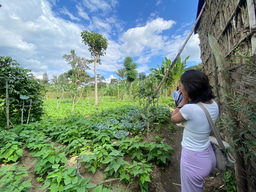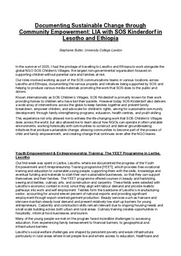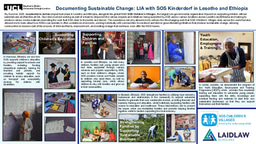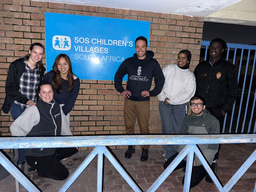Project Outline: Weaving Justice into Sustainable Tourism: Community Cohesion in Costa Rica’s Cantons

Just Sustainabilities in Tourism and Urban Planning: Impacts on Social Cohesion in Belén, Nosara, and Puerto Viejo, Costa Rica
Supervised by: Dr. Julian Agyeman, Department of Urban and Environmental Policy and Planning at Tufts University
Hello everyone! I’m Alejandro Álvarez, an International Relations undergraduate at Tufts University originally from Belén, Costa Rica. Growing up there made me increasingly aware of how sustainability initiatives and tourism-driven development reshape not just the environment, but also the social and cultural fabric of communities. While Costa Rica is often celebrated as a sustainability leader, the reality on the ground reveals uneven impacts, especially in rapidly developing or tourist-saturated regions. This project stems from my desire to explore how sustainability can be reimagined not just as an ecological imperative, but as a tool for social justice.
As such, I will be working this summer with the help of Dr. Julian Agyeman to explore the relationship between social justice, environmental sustainability, urban development and tourism in areas of rapid development across Costa Rica.
This research investigates how sustainability and tourism-driven planning policies affect social and cultural cohesion in three Costa Rican cantons: Belén, Nosara, and Puerto Viejo. Specifically, it asks how these policies influence patterns of gentrification, displacement, and cultural preservation, and how these effects can be understood through Julian Agyeman’s just sustainabilities framework. This framework emphasizes three dimensions of justice (distributive, procedural, and recognition) as essential to building sustainable futures that are not only environmentally sound but socially equitable. My research aims to evaluate whether and how these justice dimensions are reflected in the lived experiences of residents in these diverse communities.
In Belén, Nosara, and Puerto Viejo, how do municipal sustainability and tourism-driven planning policies shape (a) social and cultural cohesion and (b) gentrification pressures, when evaluated through the lenses of distributive, procedural, and recognition justice from Julian Agyeman’s just sustainabilities framework?
Objectives
The primary objective of this project is to assess how sustainability and tourism policies either support or undermine social cohesion and cultural continuity in different local contexts. I aim to identify how community members perceive and navigate the tensions between economic development, environmental protection, and social equity. Through this study, I hope to highlight best practices that promote inclusive planning, prevent displacement, and recognize the cultural heritage of historically marginalized groups. The research will also produce comparative insights across the three cantons, contributing to a deeper understanding of how place-based approaches to sustainability can (and should) center justice.
Methodology
This project employs a qualitative, comparative case study approach across three distinct regions of Costa Rica. Belén, where I am based, serves as an urban inland reference point with well-established sustainability initiatives and relatively high municipal capacity. Nosara, located on the Pacific coast, represents a community undergoing rapid gentrification and tourism expansion, often driven by foreign investment. Puerto Viejo, on the Caribbean coast, is a historically Afro-Caribbean and indigenous community currently navigating large-scale tourism proposals and ongoing cultural marginalization.
Fieldwork will take place between July and August 2025. In each location, I will conduct semi-structured interviews with a diverse range of stakeholders, including local residents, planners, small business owners, and municipal officials. I will also engage in participant observation within public spaces, local events, and tourism areas to examine how different groups interact with the built environment and with each other. Additionally, I plan to host small, community-based workshops in Nosara and Puerto Viejo that invite residents to reflect collectively on change, belonging, and sustainable futures. These workshops will use participatory tools such as mapping and dialogue to surface shared priorities and community knowledge.
To supplement the fieldwork, I will analyze local planning documents, zoning regulations, and municipal policies to understand the formal frameworks shaping development. All data will be analyzed using a thematic coding strategy aligned with the just sustainabilities framework, allowing for a structured evaluation of each case through the lenses of distributive, procedural, and recognition justice. The findings will be synthesized into a comparative analysis and shared with each community in accessible formats. Ultimately, this research aims to inform both local practice and broader scholarly conversations about how sustainability can truly serve the people it claims to benefit.
I’m thrilled to learn from this network and eager for your feedback, especially on how to strengthen community-led methods or connect with local partners!





Please sign in
If you are a registered user on Laidlaw Scholars Network, please sign in